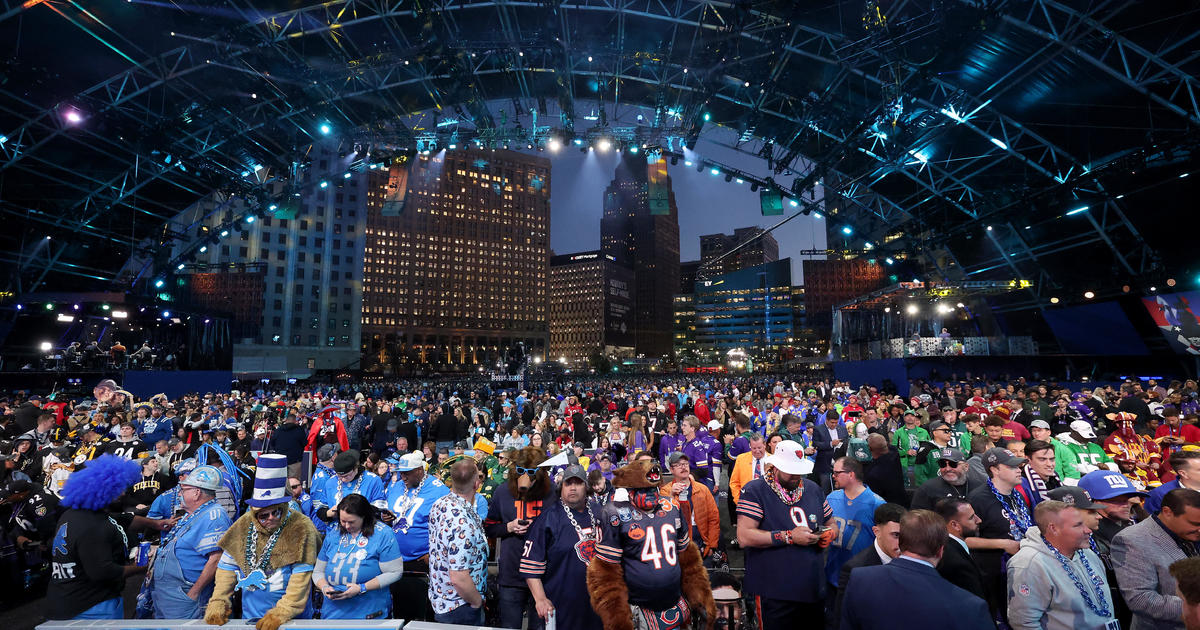'Wait, What?' Quip Tops 2022 'Banished Words List' From Lake Superior State University
SAULT STE. MARIE, Mich. (CBS Detroit/AP) — The judges of the annual "Banished Words List" at Lake Superior State University in Sault Ste. Marie have a message for texting and tweeting Americans: Your "wait, what?" joke needs to go.
The phrase topped the university's lighthearted list of 10 "winners" chosen from among more than 1,250 submissions of overused, misused and generally groan-inducing words or phrases.
"Wait, what?" irritated nominators who felt the phrase intended to show astonishment or disbelief is overused.
"Most people speak through informal discourse. Most people shouldn't misspeak through informal discourse. That's the distinction nominators far and wide made, and our judges agreed with them," said Peter Szatmary, executive director of marketing and communications at the university.
The 10 winners were chosen from among more than 1,250 submissions to the judges of the cheeky annual exercise.
The university began compiling an annual list in 1976. Past nods have gone to "détente," "surely," "classic," "bromance," and "COVID-19."
There are only three entries associated with the pandemic this year after it dominated last year's list.
"One possible takeaway from all this about the act and art and science of disclosing something is the more things change, the more things stay the same," Szatmary said. "At the very least, it's complicated."
Already thinking of word to banish? Click here to submit it for 2023.
 Here is the 2022 Banished Words List from Lake Superior State University (credit: Lake Superior State University)
Here is the 2022 Banished Words List from Lake Superior State University (credit: Lake Superior State University)
Here's the list of 2022 banished words:
1. Wait, what?
Most frequently found in text or on social media, this ubiquitous imperative question is a failed "response to a statement to express astonishment, misunderstanding, or disbelief," explained a wordsmith. "I hate it," added another, because the command query is an inexact method to convey the utterer's uncertainty or surprise. "I don't want to wait," either, continued the second impassioned nominator. Misuse and overuse.
2. No worries
Nominated by writers nationwide for misuse and overuse, this phrase incorrectly substitutes for "You're welcome" when someone says "Thank you." A further bungling relates to insensitivity. "If I'm not worried, I don't want anyone telling me not to worry," a contributor explicated. "If I am upset, I want to discuss being upset." Despite its meaninglessness, the term is recommended to emailers by Google Assistant.
3. At the end of the day
Twenty-plus years after original banishment of this phrase in 1999, the day still isn't over for this misused, overused, and useless expression. "Many times things don't end at the end of the day—or even the ramifications of whatever is happening," observed a sage. Others consider "day" an imprecise measure. Today? Present times? Banishment in 1999: overused synopsis of a conversation or debate, often by politicians and pundits.
4. That being said
Nominators cited this phrase as verbal filler, redundant justification, and pompous posturing. For instance, "however" or "but—even "that said"—does the job as a transition instead of the wordiness. "Go ahead and say what you want already!" demanded one entrant. That being said, its usefulness is certainly in doubt. As a commentator philosophized, "At the end of the day, if you will, it already has been."
5. Asking for a friend
Misuse and overuse through deceit—because the friend is a ruse. This cutesy phrase, often deployed in social media posts in a coy attempt to deter self-identification, isn't fooling anyone. Paraphrasing one sage, "Once used to avoid embarrassment, as in, 'Do you know a good proctologist? I'm asking for a friend.' Sometimes an occasional sitcom joke. Now an overused tag with absolutely no relationship to its antecedent."
6. Circle back
Treats colloquy like an ice skating rink, as if we must circle back to our previous location to return to a prior subject. Let's circle back about why to banish this jargon. It's a conversation, not the Winter Olympics. Opined a grammarian, "The most overused phrase in business, government, or other organization since 'synergy'"—which we banished in 2002 as evasive blanket terminology and smarty-pants puffery.
7. Deep dive
"The only time to dive into something is when entering a body of water, not going more in-depth into a particular subject or book," admonished a petitioner. Another stipulated that people who float the phrase aren't near pool, lake, ocean, or sea; thus, rather than dive deeply, they flounder shallowly. An editing whiz wondered, "Do we need 'deep'? I mean, does anyone dive into the shallow end?"
2022 banished words and terms deriving from COVID-19 matters:
8. New normal
Overused catchall for ways COVID-19 affects humankind—and banishment finalist last year for similar reasons. "Those clamoring for the days of old, circa 2019, use this to signal unintentionally that they haven't come to terms with what 'normal' means," a monitor elucidated. "After a couple of years, is any of this really 'new'?" another speculated. Banished in 2012 for imprudence, defeatism, and apathy stemming from societal missteps.
9. You're on mute
People switched from in-person exchanges to virtual meetings to follow the social distancing protocol of COVID-19, and the unwitting deafening silence happens on both sides of the camera. Overuse and uselessness, then, due to ineptitude. A discerning submitter encapsulated the issue: "We're two years into remote working and visiting. It's time for everyone to figure out where the mute button is." Or as a quipster summarized, "Hello? Hello?"
10. Supply chain
Word-watchers noticed the frequent, unfortunate appearance of this phrase toward the end of this year as the coronavirus persisted. "It's become automatically included in reporting of consumer goods shortages or perceived shortages. In other words, a buzzword," concluded one analyst. "Supply chain issues have become the scapegoat of everything that doesn't happen or arrive on time and of every shortage," noticed another. The adverse result: overuse ad nauseam.
© 2021 CBS Broadcasting Inc. All Rights Reserved. This material may not be published, broadcast, rewritten, or redistributed.



